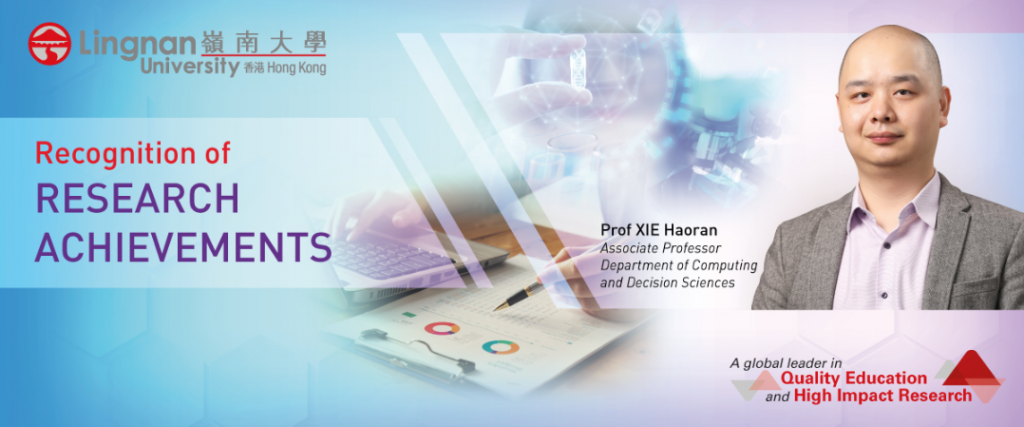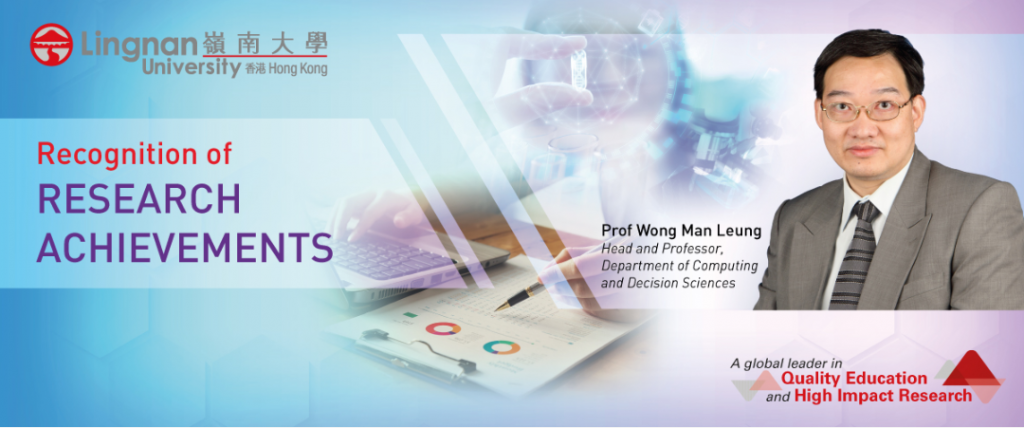Recognition of Research Achievements – Prof. Xie Haoran

Had he chosen an alternative path a few years back, Professor Xie Haoran could, no doubt, have made his name working for any of the commercial enterprises breaking new ground in the field of big data and artificial intelligence (AI).
Instead, after completing a first PhD in computer science in 2013, he opted for the world of academia, a decision he has had no cause to regret, and he did so for two well-considered reasons.
“The first was that I enjoy teaching and research which, on the one hand, allows me to transfer knowledge to my students and, on the other, to create new knowledge which can change the world,” says Xie, an Associate Professor in Lingnan University’s Department of Computing and Decision Sciences. “The second is that I come from a family of teachers. My father was a university professor; my grandfather was a secondary school teacher; and my grandmother taught in primary school. They were excellent examples and had a great impact on my own choice of career.”
The hope that results of his research work can somehow change the world is by no means overstating the case. Advances in AI and big data are already doing that and clearly have the potential to transform many aspects of our day-to-day life at home, in the workplace, in healthcare, and in the ways we interact and communicate.
“I have a strong feeling that exciting new technology and techniques will reshape how we do things today,” says Xie, who was ranked among the top 2 per cent of the world’s most-cited scientists according to a 2021 study by Stanford University. “For example, recent developments in deep learning techniques like AlphaGo and AlphaFold are bringing a significant revolution in the areas of game playing and protein structure prediction. And other AI techniques for content generation will be very impactful. The diffusion model is a powerful tool for creating new images at a level similar to professional painters, and I believe that videos, movies and music can all be generated by AI in the next few years.”
In general, he has a couple of key objectives when embarking on any research project. One is to develop more effective and efficient computational models. The other is to find ways to apply AI and big data techniques in domain-specific applications such as e-learning and e-business.
Successful examples include a novel AI model called the “least square generative adversarial network”, which won widespread recognition, with the relevant research article already cited more than 4,000 times and the key findings now covered in the deep learning course at Carnegie Mellon University.
And, in an interdisciplinary project drawing on expertise in both AI and English language education, the research team devised methods to facilitate personalised vocabulary learning.
The proposed system went on to win a gold medal and a special award at this year’s 7th International Invention Innovation Competition in Canada, with Xie’s Lingnan department colleague Professor Wong Man-leung named as joint recipient.
Also playing a big part was Professor Zou Di from The Education University of Hong Kong’s Department of English Language Education, who provided invaluable suggestions along the way on how best to apply vocabulary learning theory within the system.
“When possible I prefer conducting collaborative research,” Xie says. “I find that the communication and discussion between scholars and domain experts in different areas gives me new insights into the questions I’m investigating.”
By providing learning paths and recommending personalised tasks for students, the prototype vocabulary system can be adopted for use in secondary schools and universities, thus integrating AI techniques in the field of education to achieve clear, tangible benefits for users.
That is exactly the kind of outcome Xie is always looking for. He is a firm believer in the idea that the role and purpose of AI is to find answers to modern-day challenges, which can be done if people are prepared to take advantage of the capacities that now exist and keep pushing the boundaries.
“Research initiatives in AI and decision sciences will be more important in solving everyday problems in the near future as AI models become increasingly powerful in specific domains,” Xie says. “Scientists and researchers are already employing AI techniques to address unsolved real-life challenges in medicine, education and many other areas, and those efforts are sure to expand and improve.”
https://www.ln.edu.hk/lu-branding/distinugished-professors/scholar08.html
